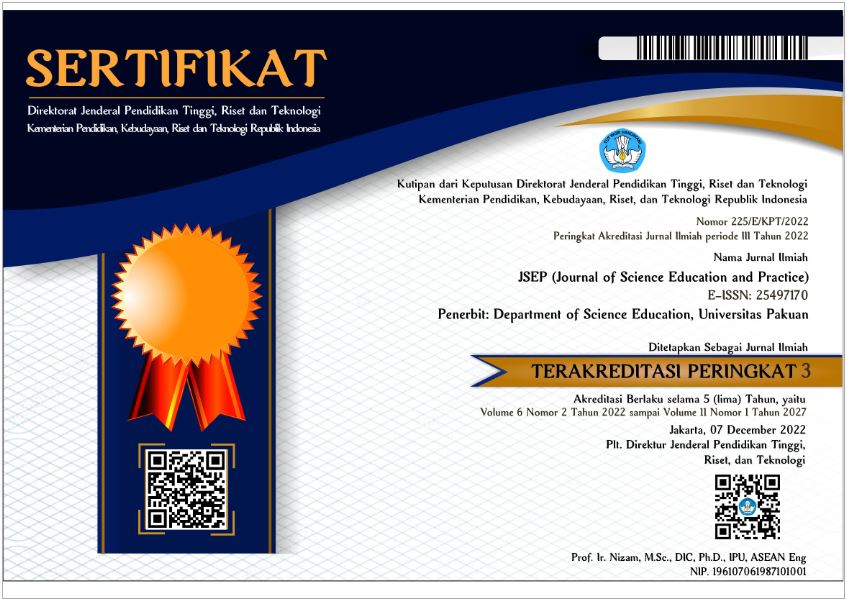ADDITIONAL MENU
Development of Learning Web to Improve Junior High School Students' Scientific Literacy
Abstract
Keywords
References
Ardianto, D., & Rubini, B. (2016). Science Literacy and Student Activities in Integrated Science Learning with Shared Type. USEJ - Unnes Science Education Journal, 5(1), 11671174.
Chandra, T., & Royanto, LRM (2019). The Effect of Math Self-Efficacy and Math Anxiety on Mathematical Performance in Fifth Grade Elementary School Students. Analytica, 11(2), 126. https://doi.org/10.31289/analitika.v11i2.2878
Fernando, A. (2022). Photostock Design and Implementation at Immanuel Christian High School Batam Using the 4D Method (Define, Design, Develop, Disseminate). Progressive Community Service Journal, 6(September), 12711275.
Fitri, F., & Ardipal, A. (2021). Development of Learning Videos Using the Kinemaster Application on Thematic Learning in Elementary Schools. Journal of Basicedu, 5(6), 63306338. https://doi.org/10.31004/basicedu.v5i6.1387
Fuadi, H., Robbia, AZ, Jamaluddin, J., & Jufri, AW (2020). Analysis of the Causes of the Low Science Literacy Ability of Students. Scientific Journal of the Educational Profession, 5(2), 108116. https://doi.org/10.29303/jipp.v5i2.122
Gani, AG (2016). e-Learning as the Role of Information Technology in Education Modernization. Suryadarma University Information Systems Journal, 3(1), 119. https://doi.org/10.35968/jsi.v3i1.52
Hardjo, Fanny Nadia. Permanasari, Anna. Permana, I. (2018). Development of Project-Based Teaching Materials on Energy Materials to Improve Students' Science Literacy. Journal of Science Education And Practice, 2(1), 2743.
Hasan, MMD (2021). Learning Media. The Media Group Throne.
Husein, SHG (2015). The Effect of Using Interactive Learning Multimedia on Results. Journal of Informatics Engineering, II(2), 136142.
Ilmiani, AM, Ahmadi, A., Rahman, NF, & Rahmah, Y. (2020). Interactive Multimedia to Overcome the Problems of Learning Arabic. Al-Ta'rib: Scientific Journal of Arabic Language Education Study Program IAIN Palangka Raya, 8(1), 1732. https://doi.org/10.23971/altarib.v8i1.1902
Juniati, N., Jufri, AW, & Yamin, M. (2020). The Use of Learning Multimedia to Improve Students' Scientific Literacy. Mipa Incandescent Journal, 15(4), 312316. https://doi.org/10.29303/jpm.v15i4.1975
Kimberly, Lawless. Scott, Brown. Christopher, Rhoads. Lisa, L. (2018). Promoting Student's Science Literacy Skills Through a Simulation of International Negotiations: The GlobalEd 2 Project. Computers in Human Behavior, 78, 389396.
Kosasi, S. (2015). Designing E-learning to Improve Teacher and Student Learning Motivation. Journal of Informatics, 0362, 27213. http://pti.undiksha.ac.id/senapati
Latip, A., & Permanasari, A. (2016). Multimedia Development of Science Literacy-Based Learning for Junior High School Students on the Theme of Technology. Education, 7(2). https://doi.org/10.15408/es.v7i2.1761
Martinah, AA, Mubarok, V., Miarsyah, M., & Ristanto, RH (2022). Development of Contextual-Based Science Literacy Test Instruments on Environmental Pollution Materials. Bioedusiana: Journal of Biological Education, 6(2), 192218. https://doi.org/10.37058/bioed.v6i2.3251
Pratiwi, SN, Cari, C., & Aminah, NS (2019). 21st Century Science Learning with Student Science Literacy. Journal of Physics Materials and Learning, 9, 3442.
Priyambodo, E., Wiyarsi, A., & Sari, RLP (2012). The Influence of Web-Based Interactive Learning Media on Students' Learning Motivation. Journal of Education: Learning Innovation Research, 42(2), 99109.
Purmadi, A., & Surjono, HD (2016). Development of Web-Based Teaching Materials Based on Student Learning Styles for Physics Subjects. Journal of Educational Technology Innovation, 3(2), 151. https://doi.org/10.21831/jitp.v3i2.8285
Rubini, B., Ardianto, D., Pursitasari, ID, & Permana, I. (2016). Identify scientific literacy from the science teachers' perspective. Indonesian Journal of Science Education, 5(2), 299303. https://doi.org/10.15294/jpii.v5i2.7689
Seprianto. (2020). The Relationship between Understanding the Basic Concepts of Chemistry and Students' Scientific Literacy Ability. CATALYST: Journal of Chemical Research and Chemistry Education, 3(1), 1723.
Septian, D. (2018). Science Learning with Interactive Multimedia Assisted Learning Cycle in terms of Initial Knowledge and Student Learning Styles. Journal of Physics and Science Education (JPFS), 1(1), 113.
Shalikhah, ND (2017). Lectora Inspire Interactive Learning Media as Learning Innovation. LPM News, 20(1), 916. https://doi.org/10.23917/warta.v19i3.2842
Soimah, I. (2018). The Effect of Computer-Based Learning Media on Science Learning Outcomes in terms of Student Learning Motivation. Natural: Scientific Journal of Science Education, 5(1), 38. https://doi.org/10.30738/natural.v5i1.2559
Sukowati, D., & Rusilowati, A. (2016). Analysis of Students' Science Literacy And Metacognitive Ability. Physics Communication, 1(1), 1622.
Yuliasih, FS (2022). 21st Century Skills-Based Assessment Instrument to Measure Science Literacy Ability of High School Students. Unnes Physics Education Journal, 3(3), 7783.
Yuliati, Y. (2017). Science Literacy in Science Learning. Journal of Pendas Cakrawala, 3(2), 2128. https://doi.org/10.31949/jcp.v3i2.592
Yuningsih, Winda. Permanasari, Anna. Permana, I. (2020). Multimedia Development of Science Learning Based On Science Literacy on The Theme of Lightning. Journal of Science Education And Practice, 4(2010), 6984.
DOI: 10.33751/jsep.v6i2.5942
 Abstract views : 427
Abstract views : 427
Refbacks
- There are currently no refbacks.
Copyright (c) 2022 JSEP (Journal of Science Education and Practice)

This work is licensed under a Creative Commons Attribution 4.0 International License.












